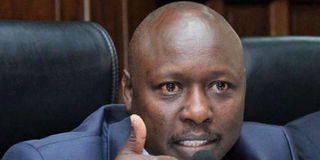Breaking News: At least 10 feared to have drowned in Makueni river
MPs want tokens firms audited

Kenya Power Chief Executive Officer Ken Tarus speaking before Senate's Departmental Committee on Energy on May 3, 2018. PHOTO | FILE | NATION MEDIA GROUP
What you need to know:
- Kenya Power CEO Ken Tarus said 85 per cent of tokens are bought through the company’s paybill number.
- Mr Nassir has proposed an amendment to create room for a competitor for Kenya Power in the Energy Bill.
The Public Investments Committee has asked the Auditor-General to conduct a special audit of the system used by Kenya Power to generate tokens for prepaid electricity consumers.
Mvita MP Abdulswamad Nassir, who chairs the committee, said members are concerned about reports that companies could be minting millions off the system at the expense of Kenyans.
“One of the issues that we are going to be requesting at the special audit is how this whole thing was tendered, to look at the details of those companies, whether they are qualified to offer those services and the financial services,” Mr Nassir said.
He said that although the matter had not come up in the audit reports that the committee scrutinises as part of its mandate, there was sufficient public concern to warrant a special audit.
POWER BILLS
Company officials were scheduled to meet the committee on Friday but asked for the meeting to be postponed to allow the management deal with other issues.
Kenya Power enjoys a monopoly in the distribution of power and has come under the spotlight over the past month because of inflated power bills and failures and delays in the generation of tokens.
The company has been accused of promoting third party vendors that charge customers more than Kenya Power itself for purchasing the tokens.
Despite attempts to explain how power is charged, it has also faced criticism over apparent inconsistencies in the way the units are charged.
PAYBILL
Its critics say that Kenya Power has been marketing third party vendors such as VendIt and Dynamo Digital Company, which charge more for transactions than Kenya Power’s own 888880 M-Pesa paybill number.
“I am also a victim of this,” Mr Nassir said.
“I remember one time in my house we got caught up in this anomaly and we had to call some very very senior people at KPLC to try and figure out what was happening and by the time it was solved, we had to spend time in the dark,” he added.
Kenya Power Chief Executive Officer Ken Tarus said 85 per cent of tokens are bought through the company’s paybill number, creating a backlog that often takes time to clear.
BILLING SYSTEM
Over the Easter weekend however, there were delays of up to 24 hours.
On Monday, the company informed its customers that there would be no token generation between 10pm Tuesday and 6am Wednesday morning.
The company said the unexplained increase and inconsistencies in bills arose because of a transition from an old to a new billing system.
Mr Nassir has proposed an amendment to create room for a competitor for Kenya Power in the Energy Bill, which is currently being processed in the National Assembly.
The National Assembly last year failed in an attempt to force Kenya Power to compensate customers for power blackouts after President Uhuru Kenyatta rejected the Energy Bill partly on the basis of the amendments introduced in the House.
The bill has since been published again and is being processed in the National Assembly before transmission to the Senate and then the President for approval.





